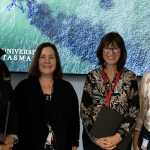- The NHMRC has just announced new grant funding commencing in 2022.
- Professor Bruce Taylor of the University of Tasmania, TAS, was awarded a $2,335,378 Investigator Grant to investigate genetic and environmental risk factors for MS onset and progression.
- Professor Stephen Lord of the University of New South Wales, NSW, was awarded a $2,352,015 Investigator Grant to evaluate ways to prevent falls in people with MS.
- Professor David Tscharke of the Australian National University, ACT, was awarded a $2,072,570 Investigator Grant to look at how viruses interact with our bodies to develop better therapies that could be beneficial for people living with MS.
- In addition, Dr Sudarshini Ramanathan of the University of Sydney, NSW, was awarded a $1,551,689 Investigator Grant to increase our understanding of processes involved in other autoimmune neurological diseases to identify new treatment targets.
Over $6.7 million dollars will be invested into MS research by the National Health and Medical Research Council (NHMRC) in their funding scheme. MS Australia congratulates MS researchers Professor Bruce Taylor (TAS), Professor David Tscharke (ACT) and Professor Stephen Lord (NSW), who have received Investigator Grants totalling $6.75 million in the recently announced NHMRC funding for 2022. We also congratulate Dr Sudarshini Ramanathan, awarded an Investigator Grant in a closely related field studying other autoimmune neurological disorders. The NHMRC changed their funding landscape two years ago to support innovative research, support a broad range of health and medical research, and promote collaborations. The Investigator Grant combines salary and research support into one grant, which is now provided over a five-year period. Significant grants of this nature are a welcome development in supporting Australian researchers to develop longer-term research programs, allowing flexibility to pursue important new research directions as they arise. All three researchers have been previous recipients of MS Australia funding and it is fantastic to see that they are receiving support from the government for their ongoing research into MS. Only 15% of applicants were funded through this grant program.
Professor Bruce Taylor from the University of Tasmania was previously awarded a Paired Fellowship alongside Associate Professor Kaylene Young from MS Australia and the Macquarie Group Foundation, to bridge the gap between laboratory findings and clinical practice. This fellowship allowed them to work towards new discoveries that may provide new treatments to protect and repair the nervous system. Professor Taylor has now received a $2,335,378 Investigator Grant from the NHMRC to determine the factors that affect MS risk and drive progression. His work will use advanced genetic techniques to understand why MS is more common in some families, and how genes, the environment and personal behaviours influence MS risk and progression.
Professor Stephen Lord from the University of New South Wales was awarded an Incubator Grant from MS Australia in 2018 which supported the early stages of his research. He has now received a $2,352,015 Investigator Grant from the NHMRC to extend this research and evaluate interventions to prevent falls. People with MS are at a high risk for falls, and strategies to prevent falls are urgently needed. By developing software, diagnostic tools and balance training systems, his program aims to improve the health and wellbeing of people with MS with balance impairments.
Professor David Tscharke from the Australian National University was awarded an Incubator Grant from MS Australia in 2020. He has also received a $2,072,570 Investigator Grant from the NHMRC to improve health by understanding how viruses interact with our bodies. He aims to understand how our immune system detects and kills virus-infected cells and use this information to find ways to target viruses that hide in our bodies with therapies. Ultimately, this work will improve the ability to identify the parts of the virus the immune system will attack, which is an important step in harnessing this part of the immune system better in immunotherapies. This will be particularly important for people living with MS on certain disease-modifying therapies.
It is also extremely encouraging to see in this NHMRC funding round the number of projects focusing on neurodegenerative conditions. Among them is Dr Sudarshini Ramanathan, who received an Investigator Grant to look into underlying autoimmune neurological disease processes to identify new treatment targets, as well as develop diagnostic and therapeutic guidelines to improve health outcomes.
We are very excited by the potential of these grants to help improve our understanding of MS and ultimately provide highly targeted and effective approaches to halt and reverse the effects of MS. We look forward to further announcements of funding outcomes from the NHMRC later this year.




